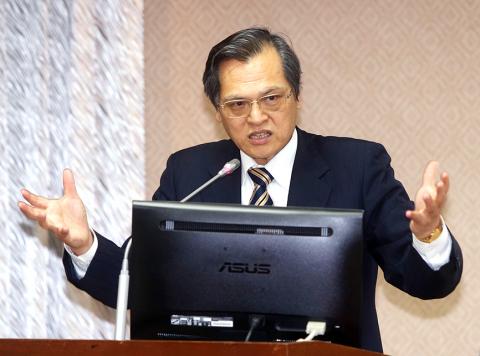Newly inaugurated Mainland Affairs Council Minister Chen Ming-tong (陳明通) yesterday urged the public to stop fixating on the so-called “1992 consensus,” saying that cross-strait issues should be dealt with through laws.
At his first question-and-answer session at the Legislative Yuan in Taipei during a meeting of the Internal Administration Committee, Chen, who took office on Monday, was pressed by several Chinese Nationalist Party (KMT) lawmakers about his stance on the “1992 consensus.”
Due to the refusal of President Tsai Ing-wen’s (蔡英文) administration to acknowledge the “1992 consensus,” cross-strait exchanges have come to a standstill, leaving “staff at the council and the [semi-official] Straits Exchange Foundation with almost nothing to do,” KMT Legislator Sra Kacaw said.

Photo: CNA
Asked by Sra Kacaw how he intended to further cross-strait ties without embracing the “1992 consensus,” Chen said: “The content of the ‘1992 consensus’ has been debated in Taiwanese society. The public and I are perfectly aware of the KMT’s support for the concept of ‘one China, different interpretations,’ but there are also people who do not believe it exists.”
The Tsai administration’s guiding principle is to deal with cross-strait affairs through laws, including the Constitution and the Act Governing Relations Between the People of the Taiwan Area and the Mainland Area (臺灣地區與大陸地區人民關係條例), said Chen, who led the council from April 2007 to May 2008 under then-president Ma Ying-jeou (馬英九).
Several breakthroughs in cross-strait relations were made during negotiations that adhered to those two laws, he said, adding that insistence on gluing cross-strait relations to a “controversial noun” would only tie the government’s hands.
“How much longer is our society going to fixate on the term?” Chen asked.
The “1992 consensus,” a term former council chairman Su Chi (蘇起) in 2006 admitted making up in 2000, refers to a tacit understanding between the KMT and the Chinese government that both sides of the Taiwan Strait acknowledge there is “one China,” with each side having its own interpretation of what “China” means.
However, Beijing has never acknowledged the “different interpretations” part and has only mentioned the “one China” element in its references to the “1992 consensus.”
During the session, lawmakers also expressed concern about possible reactions from Beijing over an ongoing visit by Alex Wong (黃之瀚), deputy assistant secretary at the US Department of State’s Bureau of East Asian and Pacific Affairs.
Wong is the first US official to arrive following the enactment on Friday last week of the US’ Taiwan Travel Act, which encourages visits by high-level US and Taiwanese officials.
The US factor has always played a significant role in cross-strait relations, Chen said.
“Of course Beijing is going to react and we have to anticipate what kind of reactions it will have,” Chen said, but added that it was too soon to tell, as a series of multilayered incidents are likely to follow.

A Vietnamese migrant worker on Thursday won the NT$12 million (US$383,590) jackpot on a scratch-off lottery ticket she bought from a lottery shop in Changhua County’s Puyan Township (埔鹽), Taiwan Lottery Co said yesterday. The lottery winner, who is in her 30s and married, said she would continue to work in Taiwan and send her winnings to her family in Vietnam to improve their life. More Taiwanese and migrant workers have flocked to the lottery shop on Sec 2 of Jhangshuei Road (彰水路) to share in the luck. The shop owner, surnamed Chen (陳), said that his shop has been open for just

Global bodies should stop excluding Taiwan for political reasons, President William Lai (賴清德) told Pope Francis in a letter, adding that he agrees war has no winners. The Vatican is one of only 12 countries to retain formal diplomatic ties with Taiwan, and Taipei has watched with concern efforts by Beijing and the Holy See to improve ties. In October, the Vatican and China extended an accord on the appointment of Catholic bishops in China for four years, pointing to a new level of trust between the two parties. Lai, writing to the pope in response to the pontiff’s message on Jan. 1’s

TAKE BREAKS: A woman developed cystitis by refusing to get up to use the bathroom while playing mahjong for fear of disturbing her winning streak, a doctor said People should stand up and move around often while traveling or playing mahjong during the Lunar New Year holiday, as prolonged sitting can lead to cystitis or hemorrhoids, doctors said. Yuan’s General Hospital urologist Lee Tsung-hsi (李宗熹) said that he treated a 63-year-old woman surnamed Chao (趙) who had been sitting motionless and holding off going to the bathroom, increasing her risk of bladder infection. Chao would drink beverages and not urinate for several hours while playing mahjong with friends and family, especially when she was on a winning streak, afraid that using the bathroom would ruin her luck, he said. She had

MUST REMAIN FREE: A Chinese takeover of Taiwan would lead to a global conflict, and if the nation blows up, the world’s factories would fall in a week, a minister said Taiwan is like Prague in 1938 facing Adolf Hitler; only if Taiwan remains free and democratic would the world be safe, Deputy Minister of Foreign Affairs Francois Wu (吳志中) said in an interview with Italian newspaper Corriere della Sera. The ministry on Saturday said Corriere della Sera is one of Italy’s oldest and most read newspapers, frequently covers European economic and political issues, and that Wu agreed to an interview with the paper’s senior political analyst Massimo Franco in Taipei on Jan. 3. The interview was published on Jan. 26 with the title “Taiwan like Prague in 1938 with Hitler,” the ministry